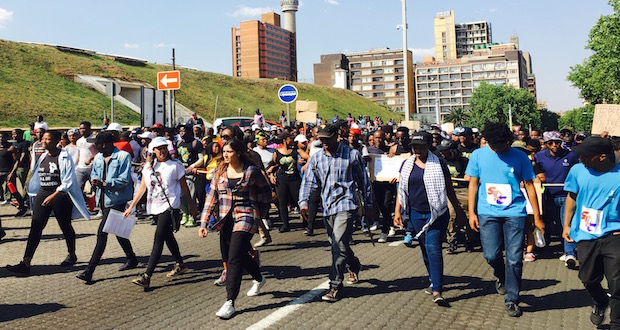Since the announcement by President Jacob Zuma in December of free education for the poor and working class, there’s been a lot of confusion surrounding how government would implement it. Besides plans for 2018, government have not provided much information surrounding the policy, resulting in widespread speculation about what Zuma’s announcement would practically work. The Daily Vox summarises the key questions we have about government’s implementation plans.
1. What is the roll out plan?
Last week the minister of finance Malusi Gigaba announced that plans were moving ahead smoothly for the roll out of free education over the next eight years – three years more than what was originally indicated in the presidency’s statement in December.
For the 2018 year the presidency has already promised the following:
- First-year students from households earning less than R350 000 a year will have to pay no fees – the minister of higher education and training will revise this amount periodically in consultation with the Minister of Finance.
- Students already on NSFAS will have all their loans converted to grants for further years of study.
- No fee increases for students earning under R600 000, for the 2018 academic year.
- No registration fees for students from households earning less than R350 000.
But as for the rest of the seven years, there’s at this point no time frames or solid commitments charting the progress of free education for the poor and working class.
Some of the plans that will need to happen over the next seven years include:
- Fee free education for households earning under R350 000 for students in second year and above
Building and refurbishment of new student accommodation with priority given to historically disadvantaged institutions. - An investigation into the viability of “online and blended learning†as an additional mechanism to deal with capacity challenges across the PSET sector.
- Transformation of the PSET sector as well as matters related to curriculum alignment.
Government needs to provide a young roadmap for the free education implementation plan so we can hold them accountable their to commitment.
2. How is this going to be funded?
The most frequently asked questions are how free education is going to be funded. Currently government is operating under a severe budget deficit. In the medium-term budget policy statement, treasury said the deficit was likely to reach 4.3 percent of gross domestic product in the 2017/18 fiscal year – making this highest the country has faced since 2009 financial crisis. On top of this, treasury has to fund the bailout of of state-owned enterprise such as South African Airways and the South African Post Office while facing a revenue shortfall due to a drastic decline in tax collection.
In a climate of slow economic growth commentators have speculated that funding free education will necessarily mean budget cuts to other sectors or the introduction of a new tax – though Fin24 have reported that treasury will not be introducing any new taxes.
Analysts and students who’d been pushing for free education have expressed concern that treasury would pursue funding free education by making cuts to social welfare programmes, drawing from pension funds or the Unemployment Insurance Fund – the latter of which was suggested by the fees commission.
Finance minister Malusi Gigaba has been evasive with questions on funding, saying that all will be revealed at his 2018 Budget Speech.
3. What about the decolonised part of “free decolonised education�
A large part of the #FeesMustFall movement was centred around the call for a university that moved away from Eurocentric understandings of how university functions. One of the most glaring aspects of government’s engagement regarding free education has been their erasure of decolonisation as a necessary part of planning free education. Instead what has occurred has been a repunting of the National Development Plan’s focus on commercial skills development and science, technology, engineering, and maths (STEM) disciplines – which is argued as being neoliberal plans that are the opposite to decolonisation’s principles.
4. What about postgrad students and those pursuing another undergraduate?
One of the points that has yet to be clarified is whether over the eight years the full subsidisation of higher education for families earning less than R350 000 will come to apply to students pursuing postgraduates or secondary undergraduate qualifications. NSFAS funds students for select postgraduate degrees, will this be the case with the free education plans for government?
Featured image by Mohammed Jameel Abdulla









